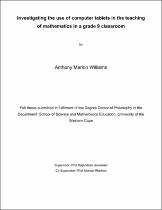Investigating the use of computer tablets in the teaching of mathematics in a grade 9 classroom
Abstract
The use of technology in mathematics education has many potentially positive outcomes. There
is, however, little evidence to show where the use of technology has made a significant impact
on mathematics education in South Africa. This study aims to address the issue of how
computer tablets are currently used in the mathematics classroom. The researcher drew a
comparison between learners who were taught with computer tablets and learners who were
taught in the traditional way by evaluating the learners' progress after being taught on the topic
of 3D images. This assessment was done in the form of a pre-test and a post-test that were
administered to both classes on a topic of 3D images that was taught during this allocated time.
The research is located in the third-generation activity theory. It is based on the socio-cultural
theory of Lev Vygotsky, but it is blended with modern western theories as described by
Engeström. The researcher made use of a mixed methods approach starting with a qualitative
survey, followed by a pre-test, observations and concluding with a post-test. The pre-test and
post-test determined whether cognitive knowledge was gained. The participants in the study
were a group of 15-year-old learners at a private school where the one class was taught using
computer tablets in the mathematics classroom, and the other class was taught the same
content without computer tablets.

